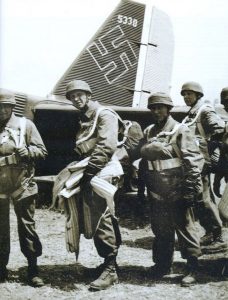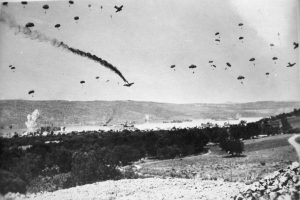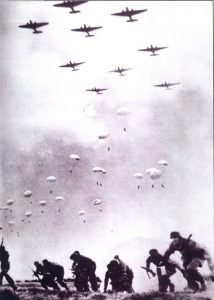 Every new for of weapon or battle plan must have a first time of use. I don’t know if the soldiers or the inventors would be more nervous as this plan unfolded, but my guess is the soldiers, who must place their lives in the hands of the inventor, and pray that he knew what he was doing. The Battle of Crete, also known as Operation Mercury was fought during World War II on May 20, 1941 to May 21, 1941. It was short-lived mostly because of the “firsts” the Allies saw during this battle.
Every new for of weapon or battle plan must have a first time of use. I don’t know if the soldiers or the inventors would be more nervous as this plan unfolded, but my guess is the soldiers, who must place their lives in the hands of the inventor, and pray that he knew what he was doing. The Battle of Crete, also known as Operation Mercury was fought during World War II on May 20, 1941 to May 21, 1941. It was short-lived mostly because of the “firsts” the Allies saw during this battle.
On that day, May 20, 1941, the Nazis began an airborne invasion of the island of Crete. Greek forced were joined by other Allied troops to defend the island. After one day of fighting, the Germans appeared to be losing, as they had suffered heavy casualties. This gave the Allies a feeling of confidence in their victory over the Nazis. Unfortunately that feeling of confidence was a little premature. The next day, the Allies encountered some communication failures, and due to the Allied tactical hesitation, as  well as German offensive operations, Maleme Airfield in western Crete fell to the Germans. This enabled the Germans to land reinforcements and overwhelm the defensive positions on the north side of the island. The Allied forces had no choice but to withdrew to the south coast. More than half of them were evacuated by the British Royal Navy, but the remainder surrendered or joined the Cretan resistance. The defense of Crete evolved into a costly naval engagement, and by the end of the campaign the Royal Navy’s eastern Mediterranean strength had been reduced to only two battleships and three cruisers…not enough to defend anything.
well as German offensive operations, Maleme Airfield in western Crete fell to the Germans. This enabled the Germans to land reinforcements and overwhelm the defensive positions on the north side of the island. The Allied forces had no choice but to withdrew to the south coast. More than half of them were evacuated by the British Royal Navy, but the remainder surrendered or joined the Cretan resistance. The defense of Crete evolved into a costly naval engagement, and by the end of the campaign the Royal Navy’s eastern Mediterranean strength had been reduced to only two battleships and three cruisers…not enough to defend anything.

So…what made this an operation of firsts? The Battle of Crete was the first time that German paratroops, known as Fallschirmjäger, were used en masse. It was also the first mainly airborne invasion in military history, and the first time the Allies made significant use of intelligence from decrypted German messages from the Enigma machine. It was also the first time German troops encountered mass resistance from a civilian population. Prior to this time the Nazis held enough power over the civilians to force them to comply. These people fought back…for the first time. Due to the number of casualties and the belief that airborne forces no longer had the advantage of surprise, Adolf Hitler became reluctant to authorize further large airborne operations, preferring instead to employ paratroopers as ground troops. In contrast, the Allies were impressed by the potential of paratroopers and started to form airborne-assault and airfield-defense regiments of their own. Major changes in military history, brought about by one battle.


Leave a Reply